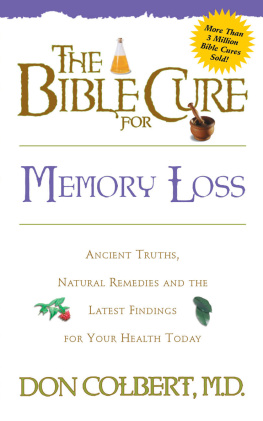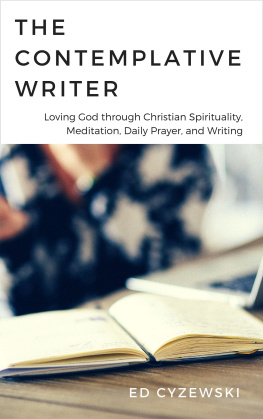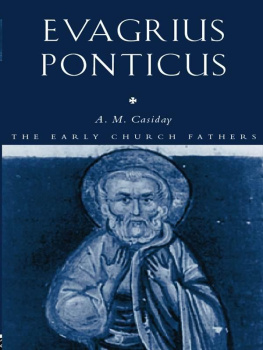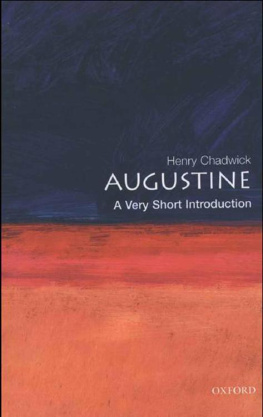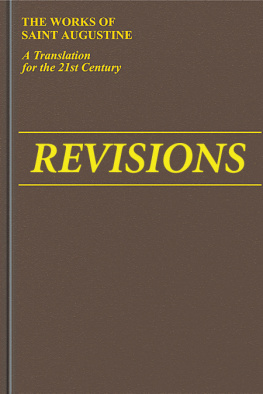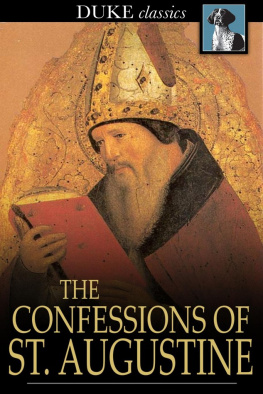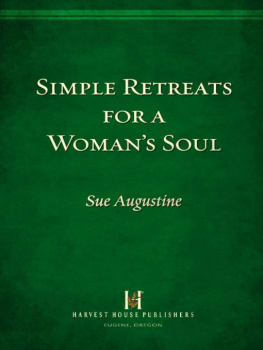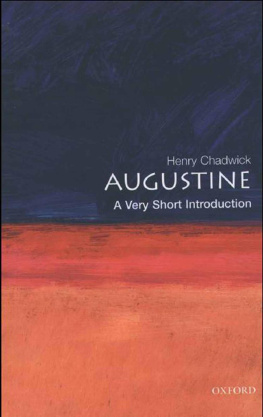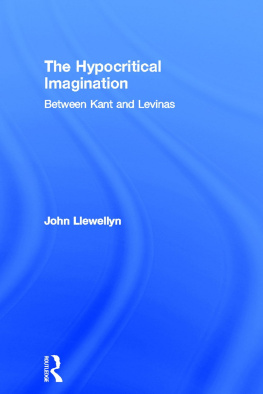Augustin - The integrated self: Augustine, the Bible, and ancient thought
Here you can read online Augustin - The integrated self: Augustine, the Bible, and ancient thought full text of the book (entire story) in english for free. Download pdf and epub, get meaning, cover and reviews about this ebook. City: Philadelphia;Pa, year: 2017, publisher: University of Pennsylvania Press, Inc., genre: Religion. Description of the work, (preface) as well as reviews are available. Best literature library LitArk.com created for fans of good reading and offers a wide selection of genres:
Romance novel
Science fiction
Adventure
Detective
Science
History
Home and family
Prose
Art
Politics
Computer
Non-fiction
Religion
Business
Children
Humor
Choose a favorite category and find really read worthwhile books. Enjoy immersion in the world of imagination, feel the emotions of the characters or learn something new for yourself, make an fascinating discovery.

- Book:The integrated self: Augustine, the Bible, and ancient thought
- Author:
- Publisher:University of Pennsylvania Press, Inc.
- Genre:
- Year:2017
- City:Philadelphia;Pa
- Rating:5 / 5
- Favourites:Add to favourites
- Your mark:
- 100
- 1
- 2
- 3
- 4
- 5
The integrated self: Augustine, the Bible, and ancient thought: summary, description and annotation
We offer to read an annotation, description, summary or preface (depends on what the author of the book "The integrated self: Augustine, the Bible, and ancient thought" wrote himself). If you haven't found the necessary information about the book — write in the comments, we will try to find it.
Augustin: author's other books
Who wrote The integrated self: Augustine, the Bible, and ancient thought? Find out the surname, the name of the author of the book and a list of all author's works by series.
The integrated self: Augustine, the Bible, and ancient thought — read online for free the complete book (whole text) full work
Below is the text of the book, divided by pages. System saving the place of the last page read, allows you to conveniently read the book "The integrated self: Augustine, the Bible, and ancient thought" online for free, without having to search again every time where you left off. Put a bookmark, and you can go to the page where you finished reading at any time.
Font size:
Interval:
Bookmark:
The Integrated Self
INTEGRATED
SELF
AUGUSTINE,
THE BIBLE,
AND
ANCIENT
THOUGHT
BRIAN STOCK

A volume in the Haney Foundation Series, established in 1961
with the generous support of Dr. John Louis Haney.
Copyright 2017 University of Pennsylvania Press
All rights reserved. Except for brief quotations used for purposes
of review or scholarly citation, none of this book may be
reproduced in any form by any means without written
permission from the publisher.
Published by
University of Pennsylvania Press
Philadelphia, Pennsylvania 19104-4112
www.upenn.edu/pennpress
Printed in the United States of America on acid-free paper
1 3 5 7 9 10 8 6 4 2
Library of Congress Cataloging-in-Publication Data
ISBN 978-0-8122-4871-5
to
Giles Constable
and in memory of
Olivia Remie Constable
The major theme of the essays in this collection is the configuration of the self in Augustine of Hippo.
Augustines concept of the self is traditionally understood to be a product of rhetorical and philosophical influences, as well as his personal manner of approaching questions of identity through autobiography. Throughout the book I speak of this way of conceiving the self as integrated. In adopting this term I have in mind Augustines use of different disciplines in giving form to his notion of the self, as well as one salient feature of his thinking. This consists in replacing a dualistic view of the self, which he took over from Platonic and Neoplatonic sources, with a view that is largely inspired by the Bible, in which mind and body are given roughly equal roles in the selfs makeup.
In I draw attention to a second feature of Augustines thinking about the self. This is its pragmatic nature. Nowhere in his writings do we come upon a purely conceptual scheme for the selfs configuration. His attitude to questions involving the self, personal identity, or the notion of the individual is on the whole practical rather than theoretical, and even when theoretical, for example in speaking of will, memory, and time, he is strongly influenced by his personal experience. This is particularly true of his statements on the self in the Confessions, where many of his important insights on the subject are found.
In approaching the self in this manner, Augustine made frequent use of a pair of literary strategies, neither of which was his invention. One of these was the Socratic method of self-examination, which is utilized extensively in his early writings and the Confessions. This is often found in the form of an interior dialogue, that is, as a conversation that takes place entirely within his own thoughts. The other literary technique that he repeatedly employed was sacred reading (lectio divina), which originated in Jewish and Christian devotions and had become a regular feature of monastic life in his time. This type of reading was an ascetic exercise involving both mind and body in which it was difficult for practitioners to think about themselves in anything but an integrated fashion.
Although Augustines combining of these methods was unusual in his time, he was not the first thinker to entertain the possibility of a holistic self. He was preceded by statements of comparable views in both philosophy and medicine. In philosophy, this thinking had already arisen in Epicureanism and Stoicism, in which, as Christopher Gill has demonstrated, an effort had been made during the Hellenistic period to formulate questions concerning the self in terms of psychophysical and psychological wholes or units.
However, Augustine arrived at this position by means of an intellectual route that did not have as its point of departure Epicurean/Stoic naturalism, Greco-Roman medical investigations, or Hellenistic adaptations of the Socratic elenchus, that is, the method of elucidating truth by means of cross-examination.
The evolution of his ideas on the subject can be dated with reasonable certitude. Down to the winter of 385386, when he was residing in a borrowed villa at Cassiciacum, along with friends, relatives, and junior associates, his reflections on the self were based almost exclusively on a group of eclectic readings in the field of philosophy, in particular on the libri Platonicorum. These Platonic books, as he calls them, had been presented to him by the rhetorician Marius Victorinus, and are thought to have contained Platonic and/or Neoplatonic texts, mostly, it is assumed, translated from Greek.conversion at Easter 386, and for the remainder of his lengthy career, his quotations from philosophical texts serve a different purpose in his writings, both in his thinking about the self and on other problematical matters in ancient thought. This consists in supporting arguments arrived at through the teachings of the Bible.
In sum, before baptism, Augustines thinking on the self is philosophical in orientation, whereas afterward it is theological, or, one might suggest, exegetical, since philosophy is employed as a way of revealing the inner meaning of statements made in the opaque language of scripture. And it is from the Bible, which Augustine frequently opposes to philosophy, that his mature philosophy of the self is constructed. He is reluctant to abandon philosophical methods, especially those with Socratic origins, but the issues he takes up are invariably Christian in conception and sometimes Jewish in their roots. He uses philosophy to analyze the functions of the soul, from which his thinking on the self is derived. But he is convinced that the origin of the soul takes place through its creation in Gods image and likeness (Gen. 1:26). Much of his discussion of the self is based on another biblical theme, namely the assumption that mortals are created with freedom of will. In his final consolidation of his views, it is this thinking that he chiefly wishes to integrate into his notion of the self.
In the Confessions, Augustine likewise provides literature with an enduring portrait of a divided self, in which flesh is constantly at war against spirit. However, it is against the backdrop of the souls essential permanence, which is founded in biblical doctrines, that the drama of the conflictual self is played out in the autobiography. In books 1 to 9, Augustines life history is presented to the reader dramatically, rhetorically, and as a deliberately staged narrative. But the dispersed or fragmented state of mind that is so vividly portrayed in this story should not be mistaken for the bishop of Hippos conception of human identity, which is ultimately based on theological considerations. On this subject he is categorical: as the soul participates in the eternity of God, so the self participates in the eternity of the soul.
The divided self is the configuration of the self that has to be discarded like an old and worn garment, as St. Paul said, so that a new self can take its place (Eph. 4:22). There are many such dualisms in Augustines thought, and they are all framed around the opposition of time and eternity: these include appearance and reality, flesh and spirit, evil and good, and of course human and divine. It is important to distinguish between such two-sided thinking in his writings and the principle of integration that underpins his fundamental theological doctrines, those, for example, dealing with sin, grace, redemption, or the resurrection, in which there can be no meaningful separation between mind or soul and body. It is in this aspect of his reflections on the self that Augustine abandons dualistic thinking and moves most clearly in a direction that differs from his ancient predecessors in the field, in particular Plato and Aristotle.
Next pageFont size:
Interval:
Bookmark:
Similar books «The integrated self: Augustine, the Bible, and ancient thought»
Look at similar books to The integrated self: Augustine, the Bible, and ancient thought. We have selected literature similar in name and meaning in the hope of providing readers with more options to find new, interesting, not yet read works.
Discussion, reviews of the book The integrated self: Augustine, the Bible, and ancient thought and just readers' own opinions. Leave your comments, write what you think about the work, its meaning or the main characters. Specify what exactly you liked and what you didn't like, and why you think so.

